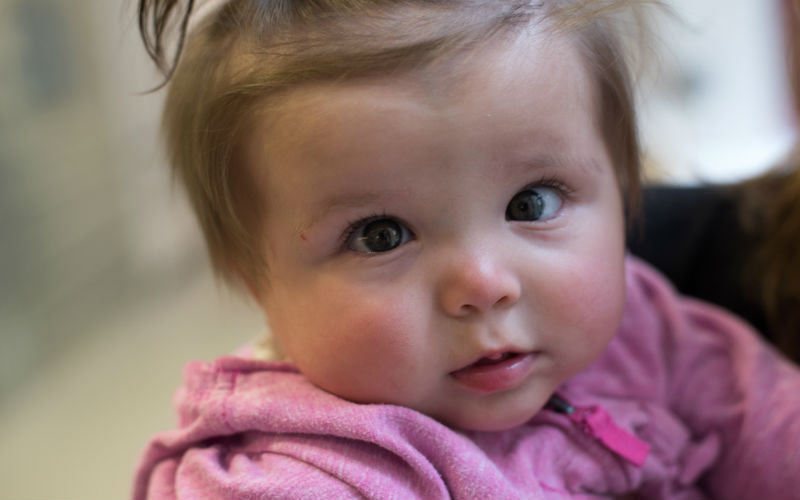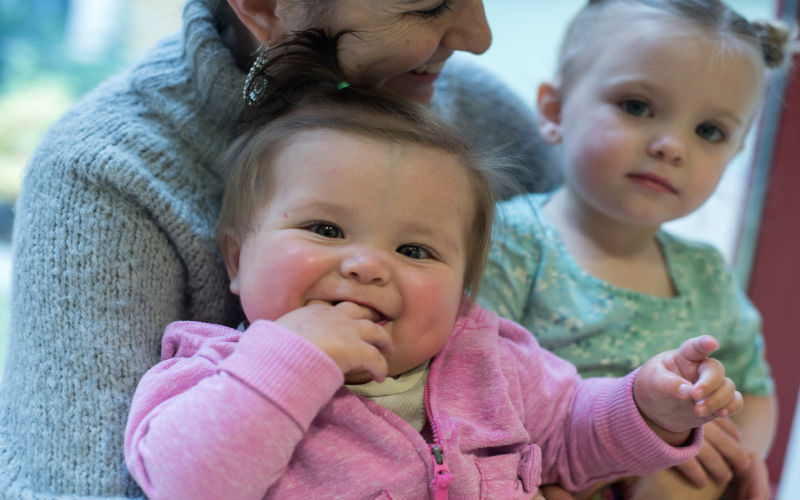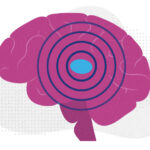Second opinion gives Charlotte a second chance

After struggling to conceive their second child, Jennifer and Keith Bent were thrilled when Jennifer became pregnant. The results of genetic testing were normal and confirmed they would be welcoming a daughter in April of 2016.
Jennifer felt the baby’s first kicks on Nov. 23, 2015. The next day, she was scheduled for an anatomy scan. “At first, everything seemed normal,” recalls Jennifer. But as the obstetrician was helping her from the exam table, he looked at Jennifer. “I have some concerns,” he told her. “I think your baby is missing part of her brain,” the obstetrician said.
Joy turned to devastation.
Charlotte’s diagnosis
The next few days were a whirlwind — a fetal MRI, amniocentesis, meeting with a fetal care coordinator.
Three days after Jennifer felt her baby’s first kicks, she and Keith met with a pediatric neurologist. He diagnosed their baby with congenital hydrocephalus — a condition that leads to buildup of spinal fluid inside the brain and compresses tissue against the skull. The prognosis was dire. Charlotte would be severely disabled, unable to eat, speak, or walk.
“We left in a daze,” says Jennifer.
A second opinion brings hope
Exhausted and confused, the couple considered their options.
“I told Keith, ‘We are getting a second opinion at Boston Children’s Hospital. It’s the number one children’s hospital in the country.’”
A few days later, the couple arrived at Boston Children’s Advanced Fetal Care Center and met with a new team — nurse Donna Morash, social worker Laurie Taylor, and practice administrator Steve Finnegan.
“I could see how terrified Jennifer and Keith were that day,” recalls Finnegan. First, Jennifer had an ultrasound. “The baby was moving and grooving as they scanned her. I could feel her kick.” Then Jennifer had another fetal MRI.
The next hours lasted a lifetime.
Donna took notes as Jennifer and Keith recounted their history for Dr. Benjamin Warf, director of Neonatal and Congenital Anomaly Surgery at Boston Children’s.
Dr. Warf’s words changed their lives. “I’ll never forget what he told us,” says Jennifer. “He said, ‘This is not a disaster.'”
As Jennifer and Keith started to process the new information, Dr. Warf explained their baby did not have hydrocephalus.
Together with two Boston Children’s radiologists who subspecialize in fetal radiology, Dr. Warf determined the baby had suffered a brain bleed, which had damaged tissue. Fluid had accumulated in the damaged area, a condition called ventriculomegaly.
Dr. Warf proceeded to explain the baby would be mildly or moderately — not severely — disabled, and the extent of her disability would become clearer after birth.
The couple then met with Dr. Christopher Elitt, a fetal-neonatal neurologist. He agreed with Dr. Warf and the radiologists.
The moral of this story is that when a doctor or many doctors give you an outcome that is the farthest thing from what you were thinking when you got pregnant, do everything you can. Get a second opinion.”
“They told us she might have learning disabilities or gross motor deficits. Those are fixable things. She can know love and feel love,” says Jennifer.
“Their lives changed. They left here with good news they weren’t expecting, and we became part of their journey,” says Dr. Finnegan.
Charlotte was born four months later on April 6 at Brigham and Women’s Hospital. After an MRI and electroencephalogram (EEG), a test to measure brain activity, she was diagnosed with bilateral perisylvian polymicrogyria. The rare condition — extra small bumps of brain tissue — is usually linked with intellectual disability.
“We started learning everything we could and reaching out to the best of the best at Brigham and Women’s and Boston Children’s,” says Jennifer.
Though there were a few minor bumps in the road in Charlotte’s first few months of life — sleep apnea that corrected itself and bronchiolitis — Jennifer, Keith, and big sister, Alexandra, adore the newest member of their family, finding her big blue eyes and dimples absolutely irresistible.
Charlotte makes gains
Jennifer and Keith were on pins and needles during Charlotte’s first outpatient appointment with Elitt that July. “We know neurology is a gray area and that we might not have an idea of her trajectory until she turned 1,” says Jennifer.
Charlotte glowed and cooed and charmed and smiled during the visit. “This is the best she could be doing,” Dr. Elitt told the couple.

Three months later, the family returned for another follow-up with Dr. Elitt. Charlotte played with her dad and practiced new skills like standing and laughing.
“Charlotte’s motor deficits are relatively mild, so I’m encouraged and cautiously optimistic about her future,” says Dr. Elitt. “Charlotte’s gains between the two appointments were substantial. It’s directly relatable to early intervention services and her parents’ tremendous advocacy.”
Dr. Elitt explained to Jennifer and Keith that they would know more about Charlotte’s cognitive abilities over the next few years. A few weeks later, an EEG showed completely normal brain activity.
“The moral of this story is that when a doctor or many doctors give you an outcome that is the farthest thing from what you were thinking when you got pregnant, do everything you can. Get a second opinion. It may be the same outcome, but at least you’ve done everything you can do,” says Jennifer.
“Fetal imaging may not be interpreted correctly, or the prognosis could be given by someone who doesn’t see babies after birth,’’ adds Dr. Elitt.
And as Charlotte’s story continues, Jennifer, Keith and Alexandra are relishing every minute of it.
Learn more about the Boston Children’s Advanced Fetal Care Center or request an online second opinion.
Related Posts :
-

‘Challenge accepted’: Sophia takes on a brain tumor
In 2023, Sophia Mordini landed the role of a lifetime. A competitive dancer, the 12-year-old would play Clara in her company’...
-

The dopamine reset: Restoring what’s missing in AADC deficiency
In March 2023, a young girl came to Boston Children’s Hospital unable to hold up her head — one striking symptom ...
-

Five things to know before getting an online second opinion for your child
Whether you want to confirm your child’s diagnosis or treatment plan, another set of expert eyes can give you ...
-

The thalamus: A potential therapeutic target for neurodevelopmental disorders
Years ago, as a neurology resident, Chinfei Chen, MD, PhD, cared for a 20-year-old woman who had experienced a very ...





